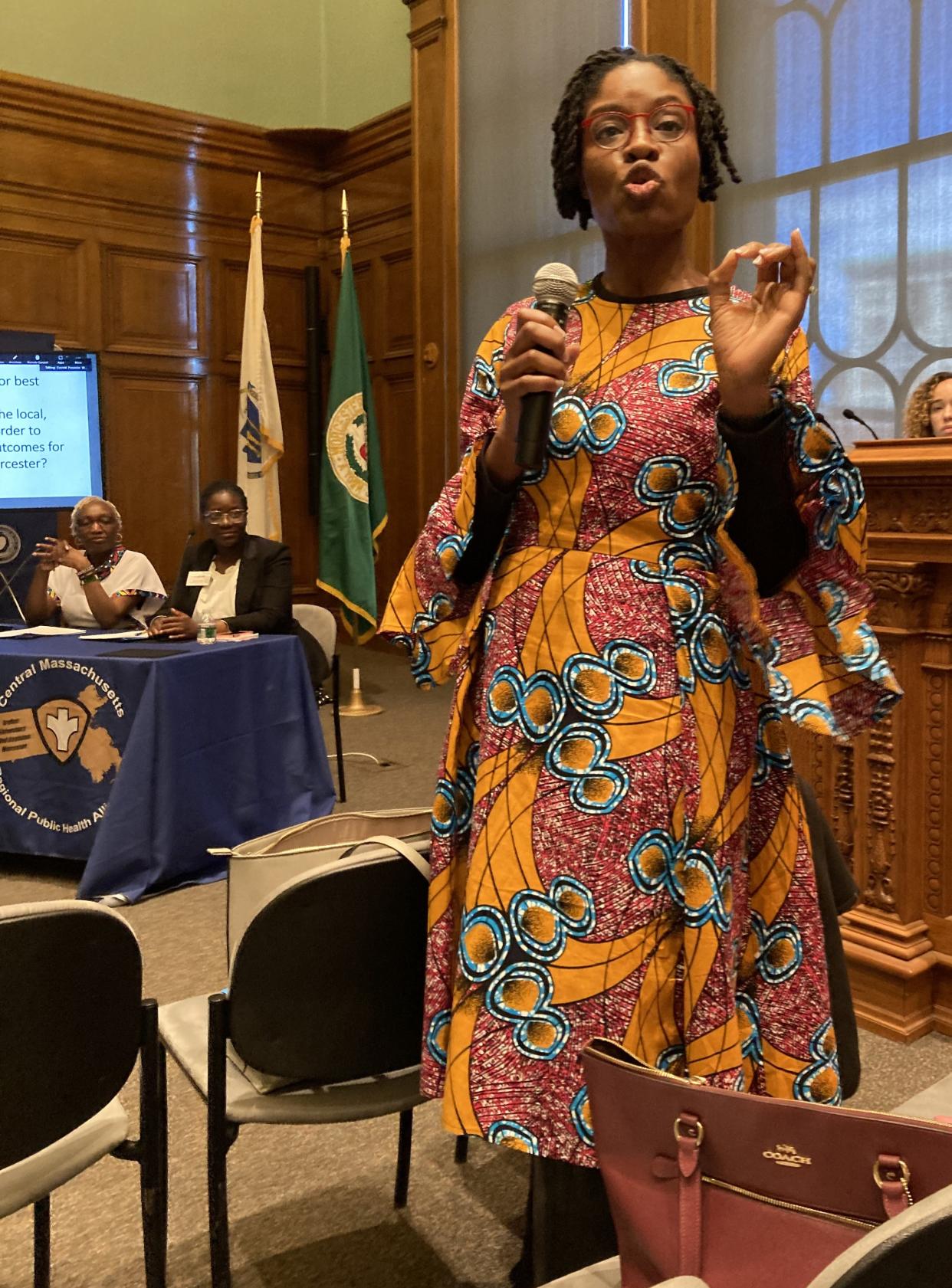Health experts discuss 'structural racism' in health care at conference at City Hall

WORCESTER — Racism is at the root of wide disparities in access to maternal health care.
That was a central message delivered by public health experts at City Hall Tuesday during a conference titled "The State of Black Maternal Health in Worcester: From Awareness to Action."
"Structural racism is a deplorable chasm in the severe maternal morbidity rates that we see,” said Dr. Robert Goldstein, commissioner of the state Department of Public Health. “We at the Department of Public Health and public health in Massachusetts recognize racism is a serious threat to public health.
"Reversing this unacceptable trend and saving lives and families is a priority of the state Department of Public Health. We can do the hard work to improve lives for Black people and families across the commonwealth.”
Based on state numbers presented at the conference, that work won’t be easy, especially in Worcester, where the rate of infant mortality in 2022 (4.9 deaths per 1,000 live births) exceeded the statewide rate in the same year (3.3 deaths per 1,000 live births).
For Black families, the numbers in Worcester are particularly troubling. In 2022, the infant mortality rate in the Black non-Hispanic category was 10.2 deaths per 1,000 live births. Statewide, it was 5.1 deaths per 1,000 live births.
Black infant mortality in Worcester in 2022 exceeded city numbers for other race/ethnic categories:
● White: 6.4 deaths per 1,000 live births/2.7 deaths per 1,000 live births statewide
● Hispanic: 1.2 deaths per 1,000 live births/4.1 deaths per 1,000 live births statewide
● Asian/Pacific Islander: 0 deaths per 1,000 live births/1.1 deaths per 1,000 live births statewide
Why the disparity?
There are numerous barriers to access safe, high-quality care, according to speakers at the conference. Some are economic, others cultural. Multiple speakers mentioned doctors and nurses who don’t listen to patients, especially those who immigrate to Worcester and whose English isn’t their primary language.
Dr. Crista Johnson-Agbakwu rose from her seat in the audience and announced, “Racism within health care is a microcosm in our society.”
Johnson-Agbakwu is an obstetrician/gynecologist and executive director of the Collaborative in Health Equity at UMass Chan Medical School and UMass Memorial Health. “Regardless of the African diaspora, once you step foot in our country, there have been policies in place for generations where there is chronic, toxic stress that is harming our bodies,” she said.
Johnson-Agbakwu presented possible solutions to target the harm: more medical data to fully understand the maternal health disparity and how to fight it; cultural sensitivity training for all providers, with an emphasis on listening to patients and not discounting their concerns; and increasing the number of medical professionals of color. On that last point, studies show better health outcomes for patients when treated by providers of similar ethnic and racial backgrounds.
Different take
Like Johnson-Agbakwu, Kwame Appiah rose from his seat in the audience, but he had a different take on Worcester’s maternal health disparity for Black mothers. Black men and husbands need to support Black women so pregnancy isn’t overly stressful, said Appiah.
In Ghana, where Appiah grew up, men are expected to support women during pregnancy. In Worcester, conversations need to educate Black men to step up and support their pregnant partners, said Appiah.
“We have to figure out how to train Black men to support Black women so pregnancy is not stressful," he said. "That it’s something that is beautiful.”
Goldstein, the state health official, mentioned several statewide initiatives for narrowing the maternal health gap for Black women. One is increasing the number of Black-owned birthing centers that cut racial disparities in maternal morbidity and mortality. Others include timely access to neonatal and obstetric care, including holding hospitals accountable for combating structural racism in patient care and integrating performance into licensure. Timely access to maternal health data is another statewide effort.
Another is increasing the number of trained doulas that advise, inform and offer emotional and physical comfort to a mother before, during and after the birth of her child. Worcester’s Public Health Department trained 36 doulas over the past two years. They’re out in the city, providing services to pregnant mothers, especially in Black and brown communities.
Michelle Horne, who runs the department’s doula program, emphasized that MassHealth, the state’s Medicaid insurance program, covers the cost of doula services.
'More work needs to be done'
Soloe Dennis, director of Worcester’s public health department, left Tuesday's conference hearing one message loud and clear: “The primary message I heard today is that there's more work that needs to be done."
The next step, said Dennis, is to convene a working group to engage community members and the department’s existing partners to look at ways to address the challenges tied to Black maternal health.
Several committees and organizations are doing this work, said Dennis. However, identifying more resources to help pregnant mothers, especially immigrant mothers who are most in need, is a primary focus.
"We are committed to this work. This is just a start and we're gong to be honest about it," said Dennis.
Contact Henry Schwan at henry.schwan@telegram.com. Follow him on X: @henrytelegram.
This article originally appeared on Telegram & Gazette: Health experts discuss 'structural racism' in health care
